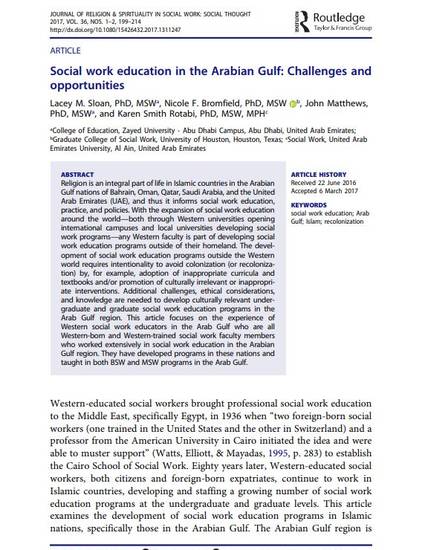
Article
Social work education in the Arabian Gulf: Challenges and opportunities
Journal of religion and spirituality in social work : social thought
(2017)
Abstract
Religion is an integral part of life in Islamic countries in the Arabian Gulf nations of Bahrain, Oman, Qatar, Saudi Arabia, and the United Arab Emirates (UAE), and thus it informs social work education, practice, and policies. With the expansion of social work education around the world—both through Western universities opening international campuses and local universities developing social work programs—any Western faculty is part of developing social work education programs outside of their homeland. The development of social work education programs outside the Western world requires intentionality to avoid colonization (or recolonization) by, for example, adoption of inappropriate curricula and textbooks and/or promotion of culturally irrelevant or inappropriate interventions. Additional challenges, ethical considerations, and knowledge are needed to develop culturally relevant undergraduate and graduate social work education programs in the Arab Gulf region. This article focuses on the experience of Western social work educators in the Arab Gulf who are all Western-born and Western-trained social work faculty members who worked extensively in social work education in the Arabian Gulf region. They have developed programs in these nations and taught in both BSW and MSW programs in the Arab Gulf.
Keywords
- social work education,
- Arab Gulf,
- Islam,
- recolonization
Disciplines
Publication Date
2017
DOI
10.1080/15426432.2017.1311247
Citation Information
Lacey M. Sloan, Nicole F. Bromfield, John Matthews and Karen Smith Rotabi. "Social work education in the Arabian Gulf: Challenges and opportunities" Journal of religion and spirituality in social work : social thought Vol. 36 Iss. 1-2 (2017) p. 199 - 214 Available at: http://works.bepress.com/karen-rotabi/40/
